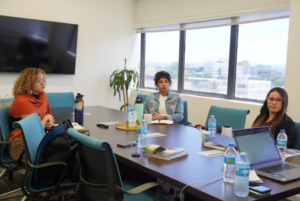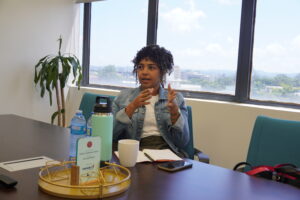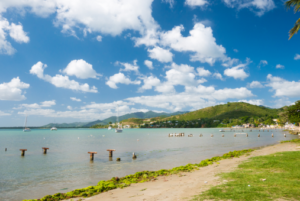
"People, when they think of Puerto Rico, only think about a natural disaster, a hurricane, an earthquake, as has happened to us in recent years," said María Arce, editorial coach of Global Press Journal.
To help change that, the news publication created a new project on the island to report stories from the heart of communities and challenge traditional narratives at the local and international levels.
Since September 2023, three new Global Press Journal reporters have sought to show the “other side of the coin,” telling stories that demonstrate the complexity of art, culture, education and society in Puerto Rican communities.

Gabriela Meléndez Rivera (left), Coraly Cruz Mejía (center) and Yerimar Rivera Rivera (right) during a Global Press Institute training session in August 2023 in San Juan, Puerto Rico. (Photo: Yasmín Porrata Morán)
“In Puerto Rico, the press deals too much with partisan political problems, the political situation, crime and atmospheric phenomena that affect us,” Yasmín Porrata Morán, reporter for Global Press Journal, told LatAm Journalism Review (LJR). “And while it is true that what happens must be covered because it is the duty of the press, there is much more than that.”
Global Press Journal produces news and features and works with local women journalists around the world in places not usually covered in the news.
This Global Press project is made up of a team of reporters who are deeply connected to their local communities and reside outside of Puerto Rico’s capital, San Juan. Porrata Morán, Gabriela Meléndez Rivera and Yerimar Rivera Rivera report from their communities in Utuado, Vega Baja and Yabucoa, respectively.
This team of reporters was the result of an intense selection process led by Arce and the Global Press Institute, the arm of Global Press that is responsible for training journalists. This new group joins journalist Coraly Cruz Mejías, a senior reporter at Global Press who has been reporting in Puerto Rico since 2019 and specializes in writing about the environment.
Arce, who works with the reporters in Puerto Rico, said that it is very valuable for journalism to expand coverage in these Puerto Rican communities.

Coraly Cruz Mejía shares her experience and advice with colleagues at Global Press Journal during an August 2023 training session. (Photo: Yasmín Porrata Morán)
“What we don't want is that, when people think of Puerto Rico, they only think of natural disasters, such as hurricanes and earthquakes, as has happened in recent years,” Arce said. “We want people to know the reality of Puerto Rico, which is much broader and more complex, from a positive point of view.”
Poratta Morán clarified that by changing the traditional narrative they do not seek to hide or mask the realities of Puerto Rico, but rather they seek to represent all those stories that subsequently go unnoticed.
“We are not hiding the truth, because in Puerto Rico there are problems, like in all countries in the world, but why do we have to focus only on that?” Poratta Morán said.
The new articles tell stories about the LGTBQ+ community and the phenomenon of “vogueing,” isolated communities that develop independently according to their needs, and dancers who confront machismo, among others.
Additionally, Arce and Poratta Morán point out two aspects of journalism and reporting at Global Press they say ensure that the stories told are stories from the hearts of the communities.

Coastline in Yabucoa, Puerto Rico (Photo: Christian Ouellet from Getty Images/Canva)
First, Global Press journalists in Puerto Rico have established relationships with local sources and are well aware of the needs, achievements and aspirations of their communities, according to the reporters. This allows them to tell stories from the perspective of the people who live there, giving a unique focus to their work.
Additionally, the reporters have complete freedom to choose which stories to report based on what they consider important in their communities, Arce said.
Finally, Global Press journalists are constantly training and developing professionally. Arce, together with the Global Press Institute team, and as head of training in Latin America, was in charge of training the three new reporters in Puerto Rico.
The great objective of this project, according to Porrata Morán, is to create truly inclusive journalism, where people in small communities can see themselves represented, and to demonstrate that journalism does not have to focus on negative issues.
“We want to show that the narrative can be different, that the stories can be different, that the protagonists of the story can be others,” she said.
*Isabela Ocampo is a third-year journalism student at the University of Texas at Austin and a social media intern at the Knight Center for Journalism in the Americas. Raised in Medellín, Colombia, she is passionate about Latin American issues, culture and art. Her recent exploration into the realm of audience engagement has been a source of both fulfillment and excitement as she aims to foster meaningful connections with her community through storytelling and good journalism.